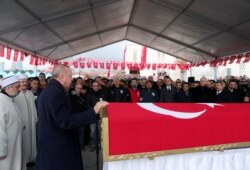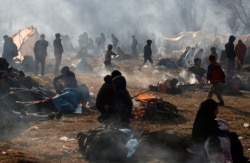Turkish President Recep Tayyip Erdogan on Saturday called on Russia to get out of Turkey’s way in Syria and allow Turkish forces to deal with Syrian President Bashar al-Assad.
In a speech to supporters, Erdogan said Turkey had "entered Syria at the demand of the Syrian people and not at the demand of Assad."
Erdogan said Turkey had retaliated against Syrian forces for killing 34 of its soldiers this week in the northwestern province of Idlib.
The Syrian Observatory for Human Rights, which monitors the Syrian war, reported Saturday that Turkey had killed 26 pro-Damascus troops around Idlib and the Aleppo countryside.
It also reported that Russian planes continued to support Syrian government forces in the battle for Idlib, despite Turkey’s call for Russia to stand aside.
Arab media reported Saturday that eight Hezbollah militiamen were killed in a Turkish drone strike on their headquarters near the town of Saraqeb.
Talks fail
Talks between Turkish and Russian military advisers during the past several days apparently failed to produce a cease-fire. Turkish Foreign Minister Mevlut Cavusoglu told journalists Saturday that Erdogan would meet with Russian President Vladimir Putin on March 5.
Also Saturday, thousands of refugees gathered along the Turkish border with Greece after Turkey announced it was opening its borders with Europe. Greek forces fired tear gas at refugees to stop them from entering Greek soil.
Erdogan said earlier Saturday that 18,000 refugees had entered Greece and that the number could rise to 25,000 to 30,000. He said Germany must send money to Turkey to deal with its refugee crisis in order to stop the flow.
His decision to open Turkey’s borders with Europe was a departure from previous policy and was seen as a means to pressure Europe.
“We can't handle a new wave of migration,” Erdogan said Saturday, referencing the crisis in Syria’s Idlib region, where nearly a million people have been displaced. Turkey currently hosts more than 3.5 million Syrian refugees and has sealed its border to new refugees.
Edward Yeranian in Cairo contributed to this report.







